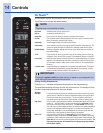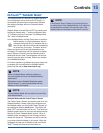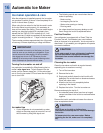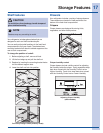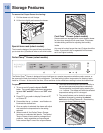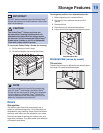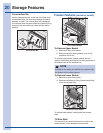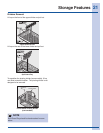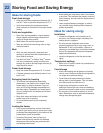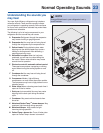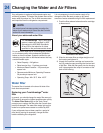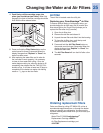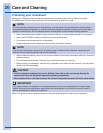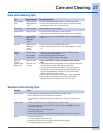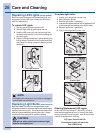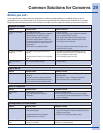
22
Ideas for storing foods
Fresh food storage
• Keepthefreshfoodcompartmentbetween34°F
and40°Fwithanoptimumtemperatureof37°F.
• Avoidovercrowdingtherefrigeratorshelves,
which reduces air circulation and causes uneven
cooling.
Fruits and vegetables
• Storefruitsandvegetablesincrisperdrawers,
where trapped moisture helps preserve food
quality for longer time periods.
• Washitemsandremoveexcesswater.
• Wrapanyitemsthathavestrongodorsorhigh
moisture content.
Meat
• Wraprawmeatandpoultryseparatelyand
securely to prevent leaks and contamination of
other foods or surfaces.
• UsetheCoolZone
TM
or Perfect Temp
TM
drawer
and set to meat/poultry setting for short-term
storage.Anymeattobekeptlongerthantwo(2)
days should be frozen.
Frozen food storage
• Keepthefreezercompartmentat0°Forlower.
• Afreezeroperatesmostefcientlywhenitisat
least ²⁄₃ full.
Packaging foods for freezing
• Tominimizefooddehydrationandquality
deterioration, use aluminum foil, freezer wrap,
freezer bags, or airtight containers. Force as
much air out of the packages as possible and
seal them tightly. Trapped air can cause food to
dry out, change color, and develop an off-flavor
(freezer burn).
• Wrapfreshmeatsandpoultrywithsuitable
freezer wrap prior to freezing.
• Donotrefreezemeatthathascompletely
thawed.
Loading the freezer
• Priortogroceryshopping,activate“fastfreeze”
so that on your return you can ensure your newly
purchased food designated for the freezer will be
preserved as quickly as possible.
• Activating“fastfreeze”alsowillhelpyour
freezer more efficiently maintain the selected
temperature after placing new purchases with
pre-existing frozen foods.
Storing Food and Saving Energy
• Avoidaddingtoomuchwarmfoodtothefreezer
at one time. This overloads the freezer, slows the
rate of freezing, and can raise the temperature of
frozen foods.
• Leaveaspacebetweenpackages,socoldair
can circulate freely, allowing food to freeze as
quickly as possible.
Ideas for saving energy
Installation
• Locatetherefrigeratorinthecoolestpartof
the room, out of direct sunlight, and away from
heating ducts or registers.
• Donotplacetherefrigeratornexttoheat-
producing appliances such as a range, oven, or
dishwasher. If this is not possible, a section of
cabinetry or an added layer of insulation between
the two (2) appliances will help the refrigerator
operate more efficiently.
• Leveltherefrigeratorsothatthedoorsclose
tightly.
Temperature settings
• Refertothe“Controls”sectionforprocedureson
temperature settings.
Food storage
• Avoidovercrowdingtherefrigeratororblocking
cold air vents. Doing so causes the refrigerator to
run longer and use more energy.
• Coverfoodsandwipecontainersdrybefore
placing them in the refrigerator. This cuts down
on moisture build-up inside the unit.
• Organizetherefrigeratortoreducedoor
openings. Remove as many items as needed at
one time and close the door as soon as possible.
• Donotplaceahotcontainerdirectlyonacold
shelf. Remember, such an extreme temperature
change may damage the glass.



